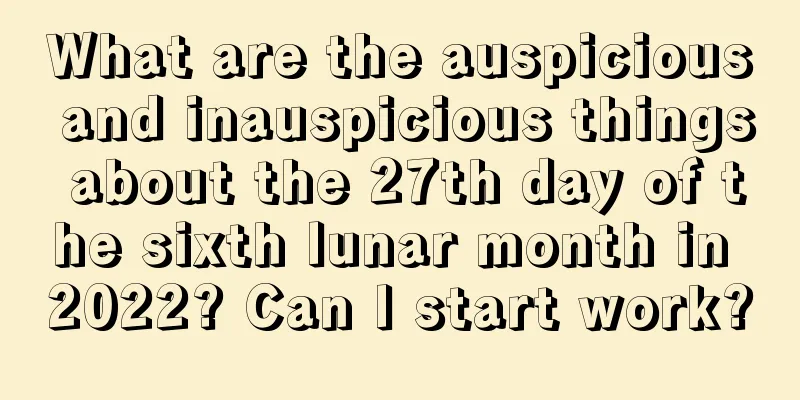Is New Year’s Eve a good day? What are the taboos on New Year’s Eve?

New Year's Eve is a traditional Chinese festival. In China, New Year's Eve is a day for family reunions. The whole family gets together to eat the New Year's Eve dinner. So is New Year's Eve a good day? What are the taboos? Time has unknowingly come to the end of the year. Fortune Teller.com has prepared some information about the 2018 Chinese New Year's Eve. Click in to learn more!How was New Year's Eve?New Year's Eve, also known as New Year's Eve, and also called "New Year's Eve" in old language, is the last night of the lunar year and is connected to the first day of the first lunar month. New Year's Eve is the last day of the lunar year and the last festival of the four seasons of spring, summer, autumn and winter in my country. Because it often falls on the 30th day of the twelfth lunar month (lunar calendar, lunar calendar, etc.), it is commonly known as "New Year's Eve" among the people, and this night is called "New Year's Eve".According to Lüshi Chunqiu·Jidongji, the ancients used drum beating to drive away the "epidemic ghost" on the day before the New Year. This is the origin of the "New Year's Eve" festival. It is said that the earliest mention of the name "New Year's Eve" was in historical books such as "Fengtu Ji" written by Zhou Chu of the Western Jin Dynasty. The word "chu" in "Chuxi" means "to go; to change; to alternate". Chuxi means "the end of the month and the year". People have to get rid of the old and welcome the new. It means that the old year is over and the new year will come. It is the last night of the lunar calendar. Therefore, the activities during this period are centered around getting rid of the old and bringing in the new, eliminating disasters and praying for blessings. It is said that in ancient times there was a four-legged evil beast named Xi. Due to the heavy snow in winter and the shortage of food, it often went to nearby villages to look for food. Because of its huge body, bad temper and abnormal ferocity, it brought great disasters to the villagers. At the end of December, people would pack their clothes, take the elderly and children with them, and go to the nearby bamboo forest to avoid the gloom. During the Zhou and Qin dynasties, at the end of each year, a "Dannu" ceremony was held in the imperial palace, in which drums were beaten to drive away the plague demons. This was called "Zhu Chu". Later, the day before New Year's Eve was called Xiao Chu, or Little New Year's Eve, and New Year's Eve was called Da Chu, or Big New Year's Eve. What are the taboos on New Year’s Eve?1. Keep the lights on all the time <br /> When you go to bed on New Year's Eve, you cannot turn off the lights. You can only turn off the lights when the sun rises on the first day of the new year. The lights on New Year’s Eve stay on all night long and are commonly known as “light years”. Regardless of whether you stay up all night or not, the lights in the house should not be turned off. They should be kept on all night long, implying a bright future in the coming year.2. Avoid taking medicine <br /> For patients who are taking medicine, if possible, it is best to stop taking the medicine temporarily and throw away the dregs of the medicine boiled before the New Year. It is said that this will be beneficial to health in the coming year. 3. Don’t talk while eating dumplings <br /> Start cooking dumplings around 11pm. After the first pot of dumplings came out of the pot, they could not be eaten. As soon as the dumplings come out of the pot, the altar must be set up, just like on New Year’s Eve. At the same time, the eldest grandson of the eldest house took the whip, and the second son lit the fire, and they set off firecrackers outside the door of their own house. After the firecrackers are set off, the whole family comes in, kowtows to their elders in order of seniority, and then starts eating dumplings. You are not allowed to talk or put down your chopsticks while eating dumplings. Even if you have finished eating, you cannot just stand up and leave. 4. Do not draw water <br /> There is a taboo of "not drawing water" during the Chinese New Year. Families with wells must "seal the well" before dusk on New Year's Eve, put a wooden cover on the well, offer cakes and burn incense to worship, and then open the cover and reuse it three days later. 5. Avoid dumping sewage and garbage <br /> It is said that if you dump sewage and garbage, litter, or urinate or defecate anywhere, the water will accidentally splash onto the gods. If the gods are angry, they will bring disaster to people. 6. It is taboo to have people visiting during mealtime <br /> During formal mealtime, it is very taboo to have people disturbing you, especially visiting you, because this is called "stepping on the New Year's meal", which will disturb the whole family. 7. Don’t touch the fish On New Year’s Eve, the whole family eats the “family reunion dinner” together, which feels like a family reunion during the Chinese New Year. When eating the reunion dinner, the "fish" on the table cannot be moved, because the fish represents "wealth" and "abundance every year", and symbolizes "wealth and luck" in the coming year. It is a decoration and cannot be touched. 8. Avoid going to bed too early <br /> Staying up all night to welcome the new year is actually staying up all night on New Year's Eve to welcome the new year. "Shousui" means to guard the last day of the year. 9. Do not say disrespectful words <br /> Many places also call New Year's Eve "auspicious night". On this night, adults and children alike must say auspicious words and are not allowed to say unlucky words, dirty words or disrespectful words, otherwise they will have bad luck for the whole year. When elders give younger generations more rice and dishes, if the younger generation is full and doesn’t want more, they cannot say “no” but “I have more”; if some tea and snacks are finished, they should say “I am very satisfied” or “There are too many” instead of directly saying “There is no more”... These auspicious words are people’s “New Year’s Eve homework”. 10. Avoid breaking objects <br /> It is also a custom to avoid breaking objects on New Year's Eve. People believe that if you break bowls, plates, cups or dishes on this day, it means bad luck in the new year. Sometimes if cups or plates are accidentally broken on this day, the elders will quickly wrap them up in red paper and chant auspicious phrases such as “May you be safe every year” to remedy the situation. People believe that placing the fragments wrapped in red paper on the altar for a few days can avert possible disasters. Therefore, in order to have a good start on New Year's Eve, people will be careful with their words and actions in order to wish for an auspicious and prosperous year. |
<<: What gift should I give to my mother-in-law on New Year's Eve 2018 to make a good impression?
>>: What day is New Year’s Eve? What are the things to pay attention to on New Year’s Eve?
Recommend
Is March 21st of the lunar calendar in 2020 a good date? Is it suitable for starting renovation?
Introduction: Before starting construction on a re...
The 27th day of the 11th lunar month in 2017 is a good day?
In the eleventh month of the lunar calendar, whet...
What is the exact time of the Great Cold solar term in 2019? What time is it?
Dahan is the last solar term among the 24 solar te...
Is the day before the heavy snow in 2019 an auspicious day for breaking ground and moving graves? Feng Shui analysis of moving graves
Introduction: Breaking ground and moving graves is...
Can rainwater be used to move house? What can you do on a rainy day?
It is important to choose an auspicious day for mo...
How can Feng Shui compass enhance personal fortune in 2017?
Introduction: In Feng Shui, the Feng Shui compass ...
Is it possible to have a caesarean section on July 16th of the lunar calendar in 2022? What is the personality of a child born on this day?
The seventh month of the lunar calendar has arrive...
When is Double Ninth Festival in 2021? What is the Double Ninth Festival also called? What is its elegant name?
The Double Ninth Festival refers to the Double Nin...
Do people born in the first month of the lunar calendar have a strong life? Is it good to be born in the first month of the lunar calendar?
A person's birth month can actually reflect hi...
Is it good for people born at the hour of Hai during the Grain Full solar term in the Year of the Pig 2019?
The main weather characteristics before and after ...
Is October 18th of the lunar calendar 2020 an auspicious day? How was the day?
The good and bad of each day are different, so let...
Can I go to the temple to pray on March 18th of the lunar calendar in 2022? OK?
Many friends go to the temple to pray for peace, b...
What are the special activities during the Summer Solstice and what traditional foods are eaten?
After entering the summer solstice, the temperatur...
What date is the seventh day of the third lunar month in 2020 in the Gregorian calendar? Is it the Monkey Day?
Every day has a corresponding zodiac sign and dat...
Is it possible to move house on Women’s Day 2019? What should I pay attention to when moving?
Is it possible to move house on Women’s Day 2019? ...









